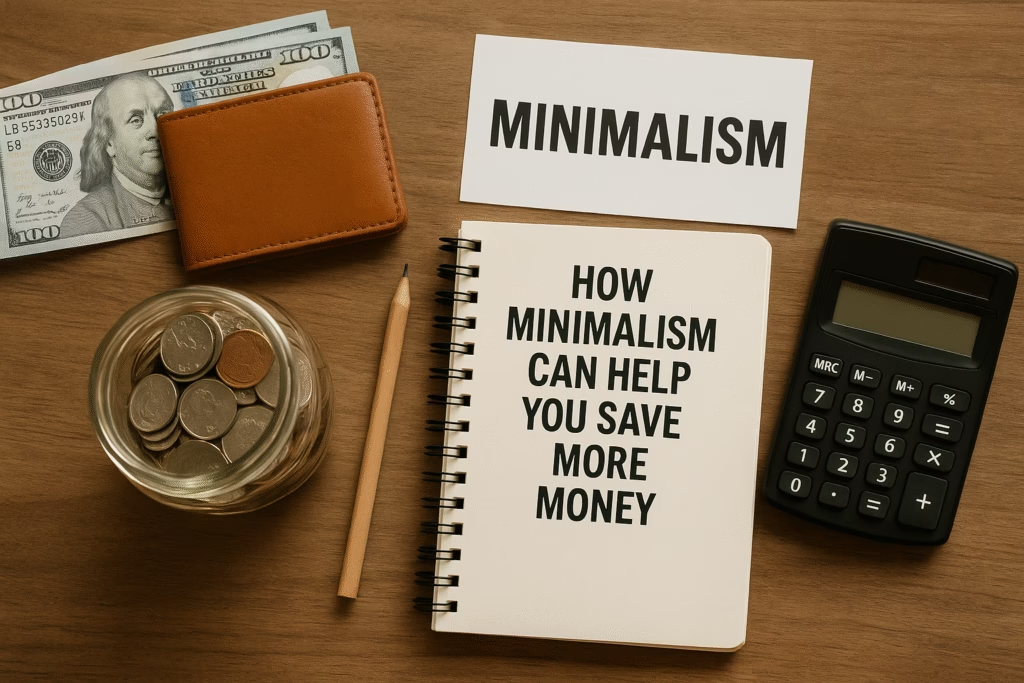Living in a world that constantly encourages consumption, the minimalist lifestyle offers a refreshing and practical alternative. At its core, minimalism isn’t about deprivation or denying yourself comfort—it’s about intentionally focusing on what truly adds value to your life. One of the most transformative effects of this approach is its powerful impact on your financial health.
In this article, we’ll explore how embracing minimalism can help you save more money, reduce financial stress, and create a more intentional relationship with your finances.
Understanding Minimalism
Minimalism is the practice of living with less—fewer possessions, fewer distractions, and fewer obligations. But more importantly, it’s about living with intention. Minimalists aim to eliminate excess so they can focus more on what truly matters, whether that’s family, creativity, personal growth, or financial freedom.
When it comes to finances, this shift in mindset can be a game-changer.
1. Buying Less = Spending Less
One of the most obvious financial benefits of minimalism is a natural reduction in spending. As a minimalist, you become highly selective about the things you allow into your life. You stop buying things for temporary pleasure and start purchasing with purpose.
Common changes include:
-
Avoiding impulse purchases
-
Thinking twice before “upgrading” devices or clothes
-
Prioritizing needs over wants
By cutting down on non-essential spending, your bank account will immediately feel the difference.
2. Reducing Lifestyle Inflation
As people earn more, they often start spending more—a concept known as lifestyle inflation. With minimalism, you resist that temptation. Even if your income grows, your minimalist values help keep your expenses in check.
Instead of upgrading to a bigger house or buying a new car just because you can, you’re more likely to:
-
Save the extra income
-
Invest in long-term goals
-
Spend on meaningful experiences rather than material goods
This mindset creates a solid financial cushion and speeds up your journey toward financial independence.
3. Creating a Functional Home
A clutter-free home isn’t just aesthetically pleasing—it’s financially smart.
Here’s why:
-
You know what you already own, so you avoid duplicate purchases.
-
You’re more likely to take care of your belongings, reducing the need to replace things frequently.
-
A minimalist home often means lower utility bills, especially if you’ve downsized or simplified your living space.
Plus, maintaining a minimalist environment encourages mindful consumption habits across the board.
4. Cutting Subscriptions and Recurring Costs
Minimalists are experts at identifying and eliminating waste. One area often overlooked is recurring subscriptions and automatic payments.
Ask yourself:
-
Do I really watch all the streaming platforms I’m subscribed to?
-
Am I using that gym membership or app subscription?
-
Do I need the premium version of every service?
Reducing these recurring expenses can lead to hundreds or even thousands in savings annually.
5. Focusing on Quality Over Quantity
Minimalism isn’t about being cheap—it’s about being intentional. Instead of buying many cheap items, minimalists often prefer fewer high-quality items that last longer.
This applies to:
-
Clothing
-
Kitchen tools
-
Furniture
-
Electronics
Although the upfront cost may be higher, you save more in the long run by not needing constant replacements.
6. Emotional Spending Declines
Minimalism also addresses the emotional side of spending. Many people shop out of boredom, stress, or social pressure. With a minimalist mindset, you become more aware of these patterns and learn to manage emotions without relying on consumption.
Instead of “retail therapy,” minimalists might:
-
Go for a walk
-
Meditate
-
Read a book
-
Connect with a friend
These healthy habits reduce emotional spending and lead to a more fulfilling life overall.
7. Simplifying Transportation and Travel
Another financial perk of minimalism is re-evaluating your transportation needs. Instead of buying the latest SUV or luxury car, a minimalist might opt for:
-
A reliable used vehicle
-
Public transportation
-
Walking or biking when possible
When it comes to travel, minimalists often choose experience over luxury, saving money on hotels, luggage fees, and unnecessary travel items.
8. Freeing Up Money for Financial Goals
By spending less, you gain the ability to allocate more money toward long-term goals, such as:
-
Building an emergency fund
-
Paying off debt
-
Investing in retirement
-
Starting a small business
Minimalism gives you clarity on what you truly value, allowing you to channel your finances toward goals that reflect those values.
9. Time Is Money (and Minimalism Saves Time)
Every item you buy takes up time—not just money. You need to clean it, maintain it, store it, and eventually replace or discard it.
By owning less, you free up mental and physical energy. You spend less time shopping, organizing, and worrying about “stuff,” and more time doing what matters most.
This time-savings can also be translated into money-saving by:
-
Cooking instead of ordering takeout
-
Doing home maintenance yourself
-
Avoiding expensive last-minute purchases
10. Aligning Your Values with Your Wallet
At its core, minimalism encourages you to align your spending with your values. Once you adopt this approach, your financial decisions become less about social pressure or habit and more about what truly enriches your life.
That could mean:
-
Supporting ethical businesses
-
Spending on education
-
Investing in health and wellness
When your money goes where your values are, financial satisfaction naturally follows.
Final Thoughts: Less Really Is More
Minimalism is more than a trend—it’s a lifestyle that can radically improve your financial well-being. By focusing on what truly matters and eliminating the unnecessary, you create more space—for clarity, peace of mind, and yes, savings.
You don’t need to live in an empty white room to be a minimalist. Start small. Cancel a subscription you don’t use. Say no to the next impulse buy. Sell something you haven’t touched in months. Little by little, these changes add up to a richer, more intentional life—both financially and emotionally.
Did you like it? Read more news like this.
Share it with your friends.






